|
Zhuang Culture
The Zhuang people of Jingxi are part of a sub-dialect of the Zhuang nationality, called the Dejing Zhuang. They are a people rich in culture and known far and wide for their embroidered handcrafts, song festivals, and interesting customs. To explore Jingxi is to explore Zhuang culture in it's most abundant form, as the population of Jingxi County is 99% Zhuang, the most highly concentrated county in Guangxi or Yunnan.
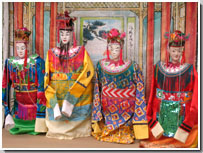 Jingxi Zhuang Nationality Museum Jingxi Zhuang Nationality Museum
A great starting point for exploring the culture of the Dejing Zhuang is the Jingxi Zhuang Nationality Museum located on Chengxi Road near the main park in Jingxi.
The museum, which first opened in 1987, includes a photography gallery, as well as exhibits on ancient rock paintings, bronze drums, stone carvings, pottery, Zhuang architecture, folk art and brocades. There is also an impressive display of Zhuang wooden puppets, musical instruments, and the largest embroidered silk ball in the world (produced for a ceremony in 1997 to commemorate Hong Kong's return to Mainland China).
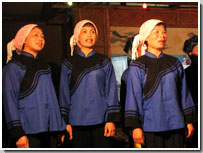 The museum is also famous for their Zhuang Music Performance Troupe, which has played in various parts of China, including Beijing. Traditional Zhuang music and singing performances can be arranged for tour groups with one-day's advance notice. The unique performance includes examples of Zhuang antiphonal singing, a traditional wedding dance, a musical number featuring the Zhuang "snail shell kazoo", and the light-hearted "Happy Harvest Dance" where men paint faces on their stomachs, put baskets on their heads, and celebrate their hard work in the fields. The museum is also famous for their Zhuang Music Performance Troupe, which has played in various parts of China, including Beijing. Traditional Zhuang music and singing performances can be arranged for tour groups with one-day's advance notice. The unique performance includes examples of Zhuang antiphonal singing, a traditional wedding dance, a musical number featuring the Zhuang "snail shell kazoo", and the light-hearted "Happy Harvest Dance" where men paint faces on their stomachs, put baskets on their heads, and celebrate their hard work in the fields.
Jingxi Zhuang Nationality Museum - 0776-6212286
Jingxi Zhuang Festivals
Whether you are visiting Jingxi in the winter, spring, summer or fall, there's a good chance you'll be there during one of their colorful festivals. Most of the Zhuang festivals follow the Chinese lunar calendar, and the exact dates vary from year to year. Here are some of the most interesting festivals in Jingxi:
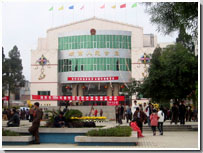 Spring Festival (Chinese New Year) - The biggest holiday in China, Spring Festival is celebrated by the Zhuang in Jingxi with the nearly unceasing sound of firecrackers throughout the city. Families return to their village homes and celebrate with feasting and the giving of hongbaos (red envelopes with money inside) to the children. A Chinese dragon also makes it's way around town over a period of two weeks, dancing outside peoples until they give it some money.
Spring Festival 2008: February 7 Spring Festival (Chinese New Year) - The biggest holiday in China, Spring Festival is celebrated by the Zhuang in Jingxi with the nearly unceasing sound of firecrackers throughout the city. Families return to their village homes and celebrate with feasting and the giving of hongbaos (red envelopes with money inside) to the children. A Chinese dragon also makes it's way around town over a period of two weeks, dancing outside peoples until they give it some money.
Spring Festival 2008: February 7
Spring Festival 2009: January 26
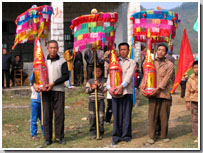 Sanhe Launching Festival (Er Yue Er) - Unique to the district of Sanhe in Jingxi County, this festival involves launching a small projectile made from burnt sugar out of paper canons full of gunpowder. Young boys then compete to see who can retrieve the object first, which typically involves running through wet and muddy rice fields.
Sanhe Launching Festival 2008: March 9 Sanhe Launching Festival (Er Yue Er) - Unique to the district of Sanhe in Jingxi County, this festival involves launching a small projectile made from burnt sugar out of paper canons full of gunpowder. Young boys then compete to see who can retrieve the object first, which typically involves running through wet and muddy rice fields.
Sanhe Launching Festival 2008: March 9
Sanhe Launching Festival 2009: February 27
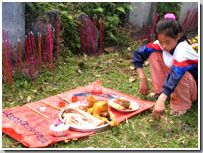 Grave Sweeping Festival (Qingming Jie) - On this holiday, Zhuang people return to their home towns and villages to clean up their ancestral graves. They will also typically light firecrackers, burn incense, and hang colorful metallic streamers over the graves to scare away evil spirits.
Grave Sweeping Festival (every year): April 5 Grave Sweeping Festival (Qingming Jie) - On this holiday, Zhuang people return to their home towns and villages to clean up their ancestral graves. They will also typically light firecrackers, burn incense, and hang colorful metallic streamers over the graves to scare away evil spirits.
Grave Sweeping Festival (every year): April 5
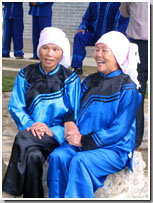 Song Festival (San Yue San) - The third day of the third lunar month is a festival to celebrate song. It is often combined with the Grave Sweeping Festival, and characterized by singing competitions all over the county, especially in Jingxi City, Jiuzhou, Equan and Huadong. Men and women compete against each other by improvising lyrics on the spot, which can be about love, tourism, or even insults!
Song Festival 2008: April 8 Song Festival (San Yue San) - The third day of the third lunar month is a festival to celebrate song. It is often combined with the Grave Sweeping Festival, and characterized by singing competitions all over the county, especially in Jingxi City, Jiuzhou, Equan and Huadong. Men and women compete against each other by improvising lyrics on the spot, which can be about love, tourism, or even insults!
Song Festival 2008: April 8
Song Festival 2009: March 29
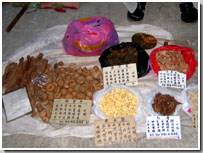 Dragon Boat Festival (Duanwu Jie) - Throughout much of China, this traditional holiday is celebrated with dragon boat races. In Jingxi, however, it is a festival of traditional herbal remedies, and the streets of the city are packed with villagers selling their own special concoctions to heal a variety of illnesses.
Dragon Boat Festival 2008: June 8 Dragon Boat Festival (Duanwu Jie) - Throughout much of China, this traditional holiday is celebrated with dragon boat races. In Jingxi, however, it is a festival of traditional herbal remedies, and the streets of the city are packed with villagers selling their own special concoctions to heal a variety of illnesses.
Dragon Boat Festival 2008: June 8
Dragon Boat Festival 2009: May 28
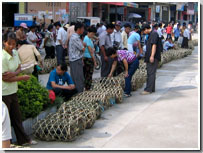 Ghost Festival (Gui Jie) - Terrifying ghost stories are told on this holiday, and the streets are lined with people selling live ducks for several days before the festival, as they traditionally sacrifice ducks on this day to keep the ghosts happy.
Ghost Festival 2008: August 15 Ghost Festival (Gui Jie) - Terrifying ghost stories are told on this holiday, and the streets are lined with people selling live ducks for several days before the festival, as they traditionally sacrifice ducks on this day to keep the ghosts happy.
Ghost Festival 2008: August 15
Ghost Festival 2009: September 3
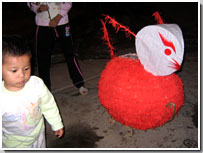 Mid-Autumn Festival (Zhongqiu Jie) - Also known as the Moon Cake Festival, this holiday is celebrated throughout China by buying and eating "moon cakes," small heavy cakes with a thick paste inside (and usually an egg yoke). In Jingxi, families walk the streets at night as their children pull small lanterns mounted on wheels. These lanterns are usually shaped like rabbits, but it's not uncommon to see elephants, chickens, and even rockets as well.
Mid-Autumn Festival 2008: September 14 Mid-Autumn Festival (Zhongqiu Jie) - Also known as the Moon Cake Festival, this holiday is celebrated throughout China by buying and eating "moon cakes," small heavy cakes with a thick paste inside (and usually an egg yoke). In Jingxi, families walk the streets at night as their children pull small lanterns mounted on wheels. These lanterns are usually shaped like rabbits, but it's not uncommon to see elephants, chickens, and even rockets as well.
Mid-Autumn Festival 2008: September 14
Mid-Autumn Festival 2009: October 3
|

